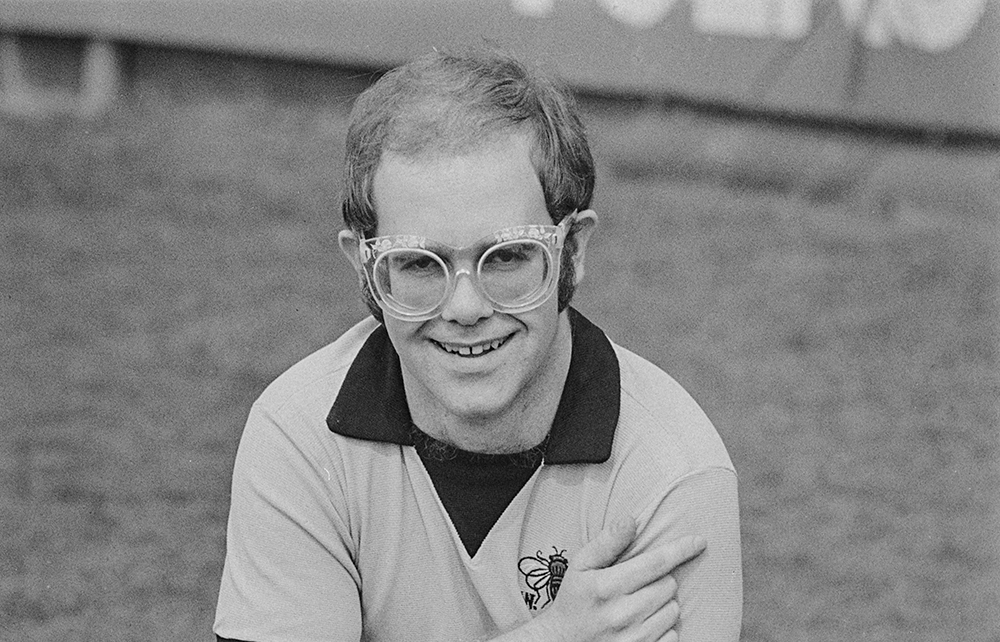One Saturday in 1953, the six-year-old Reggie Dwight of 55 Pinner Hill Road went to his first football match with his perennially gloomy father, Stanley. ‘Emerging from the Tube station,’ writes John Preston, ‘Stanley reached down and took his son’s hand.’ Reggie was enchanted by Stanley’s sudden happiness. The only place the two would ever manage to connect was on the stands at their beloved Watford FC. Once Reggie became the rock star Elton John, he bought the club and took it, improbably, to the top. He did it with a manager who was both his opposite and his soulmate, Graham Taylor – better known for his later disastrous reign managing England.
Their relationship carries Watford Forever, a wonderful, feel-good account of an ultimately English provincial story. Elton John and his husband, David Furnish, collaborated with Preston, an accomplished writer of novels and non-fiction. Taylor died in 2017, but Preston had access to his diary. In the budding field of Elton studies, Watford Forever complements this autumn’s memoir by his lyricist Bernie Taupin, and the 2019 biopic Rocketman.
Reggie Dwight spent much of his childhood hiding in his bedroom talking to his Watford programmes while his parents shouted at each other downstairs. At the risk of cod psychology, he escaped himself by becoming Elton Hercules John, in platform shoes and green hair. By 1973, he had three straight US No.1 hits. In 1976, aged 29, Elton bought Watford FC, for Reggie.
At the time, Watford were a terrible team in a terrible town wrecked by post-war planners. They played in English professional football’s lowest tier, the fourth division. Their assistant scout was 95 years old. Rats lived beneath the grandstand. Hooligan-infested 1970s English football was not the new rock and roll, and Elton was possibly the most glamorous person in it.
Soon after buying Watford, he came out to Rolling Stone magazine as ‘bisexual’ (while in fact being gay) – a brave move in the 1970s. ‘It’s going to be terrible with my football club,’ he mused. ‘It’s so hetero, it’s unbelievable. But I mean, who cares! I just think people should be very free with sex – although they should draw the line at goats.’ In the event, nobody at Watford seemed bothered about his sexuality. Elton, for his part, shrugged off homophobic abuse from rival fans: ‘I found a lot of it genuinely funny.’
Since he had shot from nowhere to the top, he took it for granted that Watford could too. He identified a promising young manager in Taylor, a conservative northerner whose favourite singer was Vera Lynn. ‘He was probably going to think I was a complete tosser,’ said Elton. But Taylor was shrewder than that. Preston quotes from his diary:
Friday, 24 June 1977: Board Meeting.
Elton John – chairman. Thirty-year-old multi-millionaire pop star. Watford supporter all his life. Local boy made world star. Wants success, doesn’t really know how to get it. No grip of board meetings and yet has a mind of his own and is no fool.
The two recognised each other’s passion and ambition. Taylor also felt for Elton, who was struggling with addiction. Preston explains one early hospitalisation: ‘As well as snorting several lines of cocaine… Elton had then proceeded to play three sets of tennis against Billie-Jean King.’ Taylor lectured him about his drinking. Never mind the players – it was Elton who needed an old-fashioned disciplinarian manager.
Watford helped save him. It was the one place where he was treated as an ordinary bloke. He’d go for dinners at the Taylors’ house and, banned by Taylor’s wife from talking football, they’d spend hours discussing the second world war. It helped that Elton was a stone-cold football fanatic. He knew, he claims, ‘all the players across four divisions of the Football League’. Eddie Plumley, an executive they hired, confirms: ‘I’d spent my whole professional life in football and I’d literally never met anyone who knew as much as he did.’ Elton loved accompanying Taylor on scouting trips to places like Rochdale, where nobody ever noticed the rock star standing on the crumbling terraces. By their side, often, was Bertie Mee, who, after retiring as a legendary Arsenal manager, had volunteered to be Taylor’s assistant in the third division. The almost self-parodically Victorian Mee became another soulmate. He completes Preston’s perfect cast of characters.
Watford rocketed to the top thanks to Taylor’s man-management skills, obsessive fitness training and simple long-ball football, along with some of Elton’s money and the discovery of the teenage genius John Barnes. In 1983, seven years after Elton’s takeover, they finished second in England. Preston writes: ‘Never before had anyone taken a football team so far in such a short time.’
When Taylor realised Watford could go no further, he joined Aston Villa and in 1990, just as Elton was drying out, became England manager. He left the job a national joke, his long-ball Watford style having fallen short in modern international football. Watford Forever is the rehabilitation he deserves. Today, at the ground where Stanley took Reggie in 1953, the Graham Taylor stand faces the Elton John stand.






Comments